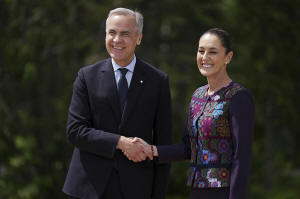G7 leaders fail to reach ambitious joint agreements on key issues after
Trump's exit
[June 18, 2025]
By ROB GILLIES, JILL LAWLESS and WILL WEISSERT
KANANASKIS, Alberta (AP) — Six of the Group of Seven leaders discussed
Russia's war in Ukraine and the Israel-Iran conflict but failed to reach
major agreements on those and many other top issues — closing a summit
that was forced to try and show how the wealthy nations’ club might
still shape global policy despite the early departure of U.S. President
Donald Trump.
Canadian Prime Minister Mark Carney and his counterparts from the U.K.,
France, Germany, Italy and Japan were joined during Tuesday's final
sessions by Ukrainian President Volodymyr Zelenskyy and NATO chief Mark
Rutte.
“We need support from allies and I’m here,” Zelenskyy said, before
adding, “We are ready for the peace negotiations, unconditional
ceasefire. I think it’s very important. But for this, we need pressure.”
The remaining leaders agreed to jointly attempt to combat what they
called non-market policies that could jeopardize global access to
critical minerals. They also pledged to limit the downsides of
artificial intelligence on jobs and the environment, while still
embracing the potential of the “technological revolution.”
There was consensus on other issues, but though the summit was meant to
showcase unity on top global concerns, no joint statement on the
conflict in Ukraine was released.
Zelenskyy had been set to meet with Trump while world leaders were
gathering in the Canadian Rocky Mountain resort of Kananaskis, but that
was scrapped. The U.S. also previously signed an agreement granting
American access to Ukraine’s vast mineral resources.

A senior Canadian official who briefed reporters at the summit said the
U.S. opposed a joint statement on Ukraine amid its efforts to promote
negotiations with Russia. The official said it only became clear during
the summit's first day on Monday that there wouldn’t be a joint
statement — though other attendees suggested no consensus agreement was
seriously on the table. Emily Williams, a spokeswoman for the prime
minister, later retracted the briefing statement and said “no proposed
statement regarding Ukraine was distributed to other leaders.”
In Trump's absence, the remaining six leaders held an extensive session
on Ukraine. Lacking unanimity, individual leaders also met with
Zelenskyy to reassure him of their support.
The summit also was largely overshadowed by a showdown over Iran’s
nuclear program that could escalate. Israel launched an aerial
bombardment campaign against Iran, and Iran has hit back with missiles
and drones.
French President Emmanuel Macron warned against the U.S. and other
powers pushing for regime change in Iran, suggesting it could
destabilize the greater Middle East.
"I believe the greatest mistake today would be to pursue regime change
in Iran through military means, as that would lead to chaos,” Macron
said.
Before leaving, Trump joined the other leaders in issuing a statement
saying Iran “can never have a nuclear weapon” and calling for a
“de-escalation of hostilities in the Middle East, including a ceasefire
in Gaza.” Getting unanimity — even on a short and broadly worded
statement — was a modest measure of success.
Macron said Carney fulfilled his mission as G7 host by preserving the
unity of the multilateral organization. “We shouldn’t ask the Canadian
presidency to resolve every issue on earth today. That would be unfair,”
said Macron, who will host the G7 next year.
Carney said in his final remarks Tuesday evening that Trump’s early exit
was about the “extraordinary” situation in the Middle East, not anything
that occurred during the summit.
“There was no problem,” Canada's prime minister said. “Mr. Trump felt it
was better to be in Washington, and I can understand that.”

[to top of second column]
|

Canada's Prime Minister Mark Carney welcomes Mexican President
Claudia Sheinbaum to the G7 Summit in Kananaskis, Alberta, Tuesday,
June 17, 2025. (Darryl Dyck/The Canadian Press via AP)

Carney said Canada would impose new economic sanctions against
Russia and was releasing its own statement offering “unwavering
support for a secure and sovereign Ukraine.” Asked if the U.S.
pushed to soften any possible joint statement from the gathered
leaders on Ukraine, Carney said he consulted with Trump while
preparing the language his own country used.
Still, Trump's departure only served to heighten the drama of a
world on the verge of several firestorms — and of a summit deprived
early of its most-watched world leader. `
“We did everything I had to do at the G7,” Trump said while flying
back to Washington. But things were getting awkward even before he
left.
After the famous photo from the G7 in 2018 featured Trump and
then-German Chancellor Angela Merkel displaying less-than-friendly
body language, this year's edition included a dramatic eye-roll by
Italian Prime Minister Giorgia Meloni as French President Emmanuel
Macron whispered something in her ear during a Monday roundtable.
That, and concerns about the Russia-Ukraine war, little progress on
the conflict in Gaza and now the situation in Iran have made things
all the more tense — especially after Trump imposed severe tariffs
on multiple nations that risk a global economic slowdown.
Members of Trump’s trade team remained in Canada to continue
discussing tariffs, including Treasury Secretary Scott Bessent, who
sat at the table as world leaders met with Zelenskyy.
Trump’s stance on Ukraine also put him fundamentally at odds with
the other G7 leaders, who are clear that Russia is the aggressor in
the war. The U.S. declined to join new sanctions against Russia,
with Trump saying, “When I sanction a country, that costs the U.S. a
lot of money, a tremendous amount of money.”
Trump also said at the summit that there would have been no war in
Ukraine if G7 members hadn’t expelled Putin from the organization in
2014 for annexing Crimea. Kremlin spokesperson Dmitry Peskov said
the G7 now looks “very pale and quite useless” compared to “for
example, such formats as the G20.”

Additionally, the U.S. president has placed greater priority on
addressing his grievances with other nations’ trade policies than on
collaboration with G7 allies.
He has imposed 50% tariffs on steel and aluminum, as well as 25%
tariffs on autos. Trump is also charging a 10% tax on imports from
most countries, though he could raise rates on July 9, after the
90-day negotiating period set by him would expire.
One bright spot for Trump during the summit came when he and British
Prime Minister Keir Starmersigned a trade framework that was
previously announced in May. Trump said British trade was “very well
protected” because “I like them, that’s why. That’s their ultimate
protection.”
But, while announcing that agreement, Trump brandished pages
spelling out the deal and dropped them. Starmer stooped to pick them
up, later explaining that he was compelled to ditch diplomatic
decorum because anyone else trying to help risked spooking the
president’s security team.
“There were quite strict rules about who can get close to the
president,” Starmer said, adding that he was “just deeply conscious
that in a situation like that it would not have been good for
anybody else to have stepped forward.”
___
Associated Press writers Josh Boak in Calgary, Alberta, and Chris
Megerian in Washington contributed to this report.
All contents © copyright 2025 Associated Press. All rights reserved |